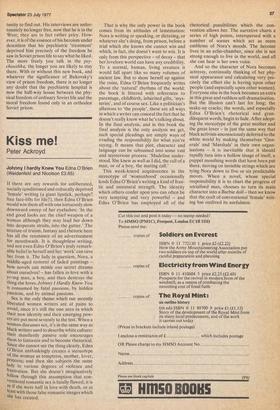Kiss me!
Peter Ackroyd
Johnny I hardly Knew You Edna O'Brien (Weidenfeld and Nicalson £3.65) If there are any rewards for unliberated, socially conditioned and culturally deprived 'female' writing (a giant lipstick, perhaps? free face-lifts for life?), then Edna O'Brien would win them all with one tortuously slow downward sweep of her eyelashes: 'In the end good looks are the chief weapon of a woman although they may lead her down into desperate straits, into the gutter.' The mixture of truism, fantasy and rhetoric here has all the resonance of an advertisement for mouthwash. It is thoughtless writing, and not even Edna O'Brien's truly remarkable belief in herself and her 'work' can save her from it. The lady in question, Nora, a middle-aged restorer of faded paintings – how novels can mimic our secret dreams about ourselves! – has fallen in love with a yo,Ing man, a boy, and then destroys the thing she loves. Johnny I Hardly Knew You IS consumed by fatal passions, by hidden passions, and by animal passions.
Sex is the only theme which our recently liberated women writers are at pains to avoid, since it's still the one area in which their new identity and their emerging pow, ers are put most severely tp the test. When a woman discusses sex, it's in the same way as black writers used to describe white culture: their manifestly passive role encourages them to fantasize and to become rhetorical. Since she cannot see the thing clearly, Edna O'Brien unthinkingly creates a stereotype of the woman as temptress, mother, lover, Princess; and then she subjects the same . lady to various degrees of violence and frustration. But she doesn't imaginatively follow through this assumption that conventional romantic sex is fatally flawed; it is as if she were half in love with death, or at least with those false romantic images which She has created.
That is why the only power in the book comes from its attitudes of lamentation: Nora is writing or speaking, or dictating, or whatever she's doing, from prison, before a trial which she knows she cannot win and which, in fact, she doesn't want to win. It is only from this perspective – of decay – that her lovelorn world can have any credibility. To a normal, human, living creature it would fall apart like so many volumes of ancient law. But to shore herself up against the ruins, Edna O'Brien frequently writes about the 'natural' rhythms of the world: the book is littered with references to parentage, childbirth, inherited gifts, 'mysteries', and of course sex. Like a politician's allusions to 'the people', these are all ways in which a writer can conceal the fact that he doesn't really know what he's talking about. In the final analysis, and in this book the final analysis is the only analysis we get, such special pleadings are simply ways of evading the responsibility for What you're saying. It means that plot, character and language can be subsumed into some vast and mysterious process: 'Madeline understood. She knew as well as I did, the call of a man, or of a boy, the mating call.'
This weak-kneed acquiescence in the stereotype of 'womanhood' occasionally lends Edna O'Brien's writing a kind of frantic and unnatural strength. The identity which others confer upon you can often be very tempting and very powerful – and Edna O'Brien has employed all of the rhetorical possibilities Which the convention allows her. The narrative charts a series of high points, interspersed with a number of scenes which act as mere • emblems of Nora's moods. The heroine lives in an echo-chamber, since she is not strong enough to live in the world, and all she can hear is her own voice.
And so the character of Nora becomes actressy, continually thinking of her physical appearance and calculating very precisely the effect she is having upon other people (and especially upon other women). Everyone else in the book becomes an extra in this great and ruthless self-dramatisation. But the illusion can't last for long; the make-up cracks; the words, and especially Edna O'Brien's rhetorical and grandiloquent words, begin to fade. After adopting the stereotype of the great mother and the great lover – in just the same way that black activists unconsciously deferred to the white world by making themselves 'Generals' and 'Marshals' in their own organisations – it is inevitable that it should rapidly turn into a hollow image of itself, a puppet mouthing words that have been put there, moving on invisible strings which are tying Nora down to five or six predictable moves. When a novel, whose special responsibility it is to chart the progress of socialised man, chooses to turn its main character into a Barbie doll– then we know that the craft of conventional 'female' writing has outlived its usefulness.






































 Previous page
Previous page